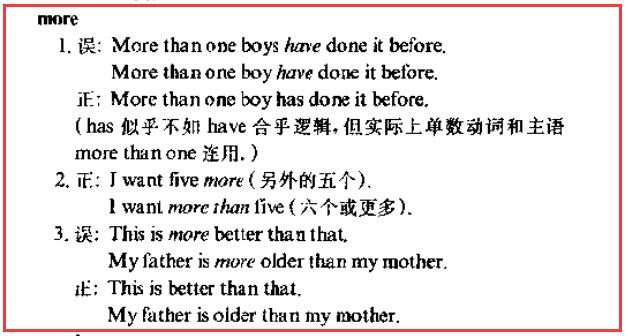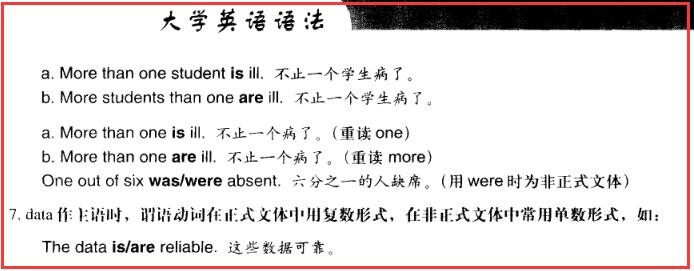5 More than one…作主语时的主谓一致问题
More than one…作主语时,谓语动词用单数还是复数?比如下面一句:
More than one person has been concerned in this affair. 不止一个人卷入了此事。
为什么为单数动词,而不用复数动词?
最佳答案 2024-07-01 23:59
more than one在句子中修饰主语时,尽管从意义上看是复数内容,但句子的谓语动词通常要用单数形式。如:
More than one journalist was killed. 不止一名记者丧生。
More than one letter is received every day. 每天收到的信不止一封。
More than one student has seen the film. 不止一个学生看过那部电影。
More than one person is interested in it. 不止一个人对此感兴趣。
More than one person is going to have to find a new job. 需要另谋新工作的不是个别人。
葛传椝等人编写的《简明英语惯用法》(上海译文出版社)认为用复数动词是错误的:

但也有人认为用单数或复数动词都可以,但重读的单词有所不同,如袁懋梓编著的《大学英语语法》(外语教学与研究出版社)就持这样的观点:
 注1:如果你是要参加考试,建议还是用单数动词吧。
注1:如果你是要参加考试,建议还是用单数动词吧。
注2:注意下面的句子用复数动词与网友的句子有所不同(More than one hundred police 的意思是“一百多名警察”):
More than one hundred police have ringed the area. 这一地区已被上百名警察包围。
其它 1 个回答
同意蒋老师的解答。
第一个截图的观点和章振邦教授的解释是一致的。
不过,对于第二个截图,有个细节问题,章教授解释地更加细致。即:但是,more than one后面如果没有名词,与这种主语结构搭配的谓语动词,既可是单数,也可是复数,这取决于more和one两个词哪一个受重读。例如:
1. More than 'one is going. (one重读)
2. 'More than one are going. (more重读)
如果按照章教授的解释,问题句最好用单数动词,因为more than one后有单数可数名词person。
附相关截图如下:

- 2 关注
- 1 收藏,3647 浏览
- 向阳花 提出于 2024-05-26 15:21
相似问题
- 涉及 committee 的主谓一致 1 回答
- 主谓一致关系 1 回答
- father and son作主语时谓语动词可以用单数吗 1 回答
- a queue of…作主语时谓语动词用单数还是复数 1 回答
- most作主语时谓语用单数还是复数 1 回答
- a team 作主语时谓语动词用单数还是复数 2 回答
-
 《高考英语备考1号·速效编》
《高考英语备考1号·速效编》
-
 《高考英语备考1号·写作编》
《高考英语备考1号·写作编》
-
 《高中英语晨读晚记》
《高中英语晨读晚记》
-
 《高中英语错题笔记》
《高中英语错题笔记》
-
 《零起点考大学英语》
《零起点考大学英语》
-
